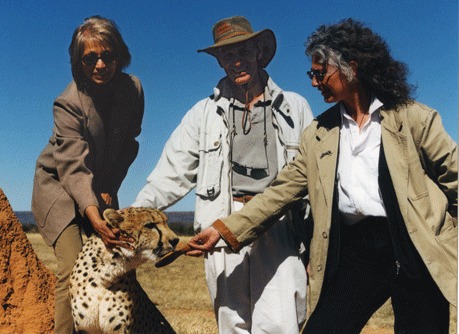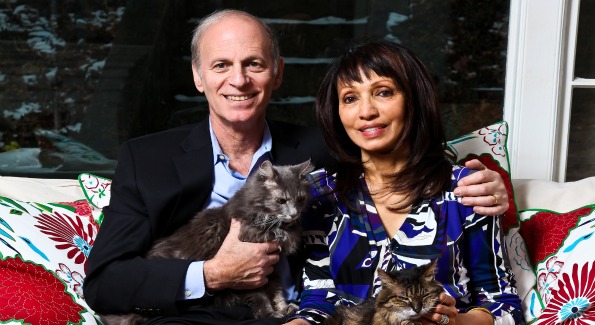President Obama’s national security advisor on Asian affairs Jeffrey Bader, accompanied by his wife, Rohini Talalla, talks optimistically about future Chinese-American relations.
It will take some time to determine if Chinese President Hu Jintao’s state visit in January will have accomplished a better working relationship between his country and the United States, but Jeffrey Bader, special assistant to President Obama on Asian affairs, believes the two world powers reached agreement and narrowed differences over issues as diverse as Iran and North Korea.
“We have substantial differences on human rights,” says Bader, who attended the state dinner along with his wife, Rohini Talalla. “China has a considerable distance to go to meet international standards, and we talked about that candidly.” Americans, he notes, “have a tendency to make China out to be 10-feet tall, but tend to forget about the enormous issues facing them.”
Bader, senior director for East Asian affairs on the National Security Council, is talking in his comfortable Chevy Chase, Md., home along with his wife, a documentary filmmaker. The pair are part of the ever-growing list of Washington power couples where each has his or her own career, making them in-demand guests on the Washington social scene.
Bader seems confident that relations with the Chinese, “while complex, are pretty good.” He emphasizes that China is a vastly different country from the U.S. historically, strategically, socially and in a number of other ways as well. The economic and trade issues discussed during the visit were a source of friction, he argues, but were similar to the problems the U.S. had with Japan in the 1980s.
He rejects the notion that China is rising as a world power while the United States is diminishing. “We have had a rough economic patch in recent years, but the U.S. is still a dominant power,” he says, pointing out that China has about 10 percent of the per capita income that Americans enjoy. Sixteen of the 20 most polluted cities in the world are located there. The Chinese are also dependent on Middle Eastern oil and have an aging population and work force – the median age is 35. “We are an innovative society,” Bader explains. “Much of their production is duplicative of our innovation.”
Bader lived from 1981 to 1983 in Beijing where it was “gray and undeveloped …There were five million bicycles and no private cars … no high-rises and no privately owned restaurants. It was grim.” Now, “things are so different. It is incredible what they have done.” He cites Shanghai as an example: “You would think you are in a modern American city.”
Bader, who served as U.S. ambassador to Namibia from 1999 to 2001, talks with the ease of a man who knows his subject while exhibiting modest pride in being an important presidential advisor. His wife moves restlessly about the room, watching over the couple’s three well-loved, rescued cats – Grey Boy, 17, found in Venice, Calif.; Foxy, 20, born in Zambia; and Baudelaire, about 17, a feral animal rescued from a snowstorm outside their home. It took a year to gain his confidence so he would move in with them. Earlier, the photographer had attempted to get all three into a photograph of the couple, but like any self-respecting, independent cats, they weren’t being cooperative.
Talalla, an exotic mix of Sri Lankan, Welsh, Burmese and Chinese ancestry, considers herself a Californian. (She immigrated to Santa Monica as a teenager after growing up in Kuala Lumpur, Malaysia). She and Bader met in New York City and were married in 1985. The documentaries she produces through PBC/KLCS in Los Angeles go directly to classrooms and can reach 800 schools and education centers in the L.A. Unified School District. The films are also in major museums and research libraries. A documentary she produced on Washington’s famed colorist painter Sam Gilliam was screened twice last year as part of the National Gallery of Art’s Film Series.
Over the last decade, Talalla has done archival taping in Africa, Europe and Asia. She has a master’s degree from UCLA that focused on the economic development of the Black Muslims (Nation of Islam) of Compton, Calif.

Rohini Talalla (left) and Jeffrey Bader greet Chewbacca the cheetah in Namibia with Laurie Marker, founding director of the Cheetah Conservation Fund. (Family Photo)
She is executive chairman of the Bridge Fund for sustainable development and cultural preservation in China and Tibet and also serves on the Cheetah Conservation Fund of Namibia.
“Twenty-five percent of the world’s cheetah population is in Namibia,” Bader interjects, prompting his wife to mention with some pride that the head of the fund, Laurie Marker, named an orphaned baby cheetah “Tiny Rohinitalalla.” “It is the spunkiest and bravest little cat,” Talalla says, noting that the cub’s mother had been “shot and killed.”
She jokes that she moved to Washington “kicking and screaming” and remains a Californian at heart. Pointing to the large floor-to-ceiling windows and flowing open space, she says they bought the house because it had California style. Art and artifacts from their travels – most of it Southeast Asian – fill every available space.
Talalla admits that Washington is where to find the best and the brightest, and where dinner conversations are stimulating. She mentions veteran diplomatic hostesses Ina Ginsburg and Esther Coopersmith as special friends she has made here.
Former U.S. Ambassador to China Jon Huntsman says that he and his wife, Mary Kaye, are the couple’s close friends. “As a long-time Asia hand, I can tell you there is no one more admired in the profession than Jeff Bader. It is deep, broad based and transcends politics … even more unusual, is the level of respect in which he is held in capitals throughout Asia.”
Huntsman notes that Bader’s standing is complemented by that of his wife, “who adds the cultural sophistication to this extraordinary couple. While Jeff is talking about nuclear disarmament on the Korean peninsula, Rohini will engross you in conversation about her latest film project in Malaysia or pursuing her passion of empowering Muslim women in Southeast Asia.”
Conversation with the couple is both easy and wide-ranging. They often finish each other’s sentences or expand on topics of conversation the other has raised. Bader, who was born in Brooklyn and has both his master’s and doctorate degrees from Columbia University, has worked in several countries in the Foreign Service. After leaving government he worked at Stonebridge International (now the Albright Stonebridge Group) and then at the Brookings Institute.
He says he first met then-Sen. Barack Obama after receiving a call that the Illinois Democrat wanted to discuss trade in his Capitol Hill office. Over a Thai lunch, the small group talked for about three hours.“ I heard him for one minute and was convinced that this man was going to run for president and win. I called Susan Rice [now ambassador to the United Nations] and said: ‘If he announces he is running, call me.’”
When the presidential campaign started there were four people serving as Asian advisors. Bader says that by the time Obama was nominated, there were 60. Talalla adds that for her husband, it was like being present at the creation and that “he couldn’t stop talking about Obama.” He emphasizes that he remains profoundly impressed with the president’s intellect, temperament and curiosity.
Bader travels constantly for work and his wife has been to 100 countries, many “on the edges of the earth.” On one recent milestone birthday she went sky diving without telling her husband. When he later learned of it, she adds, “he went nuts.” The one place they both visit every year is Hawaii, where she scuba dives and Bader snorkels.
“It is very restful,” Talalla says, especially for one reason: “No fish has ever wanted an on-the-record statement on China.”

